What Are the Most Common Misconceptions About Chinchilla Behavior?
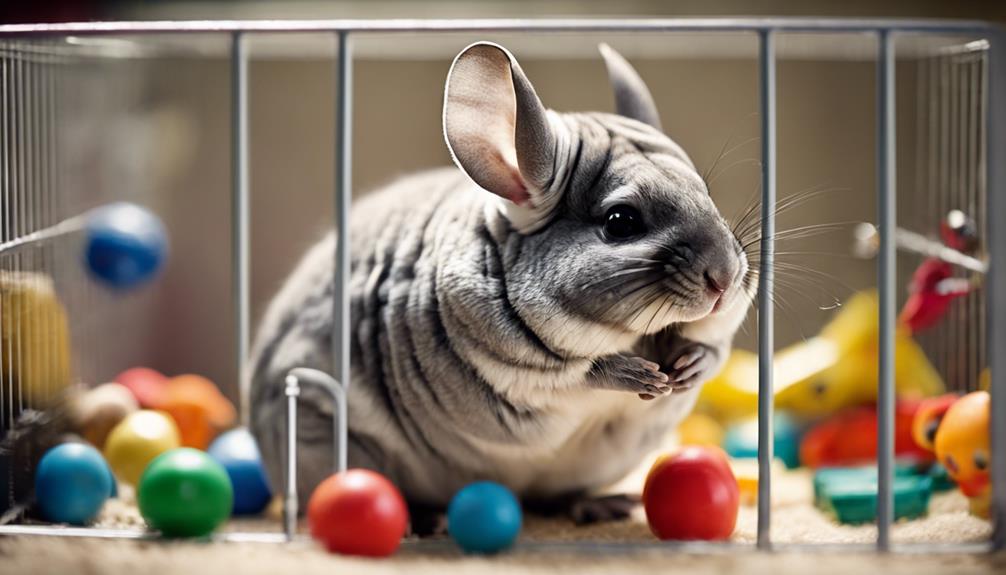
Chinchillas are often misunderstood creatures due to several misconceptions surrounding their behavior. One common myth is that chinchillas are nocturnal animals when, in fact, they are crepuscular, meaning they are most active during dawn and dusk. Another misconception is that chinchillas require a high-protein diet, whereas they actually thrive on a diet rich in fiber with limited fats and sugars. Additionally, some people believe that chinchillas are solitary animals, but they are actually social creatures that benefit from companionship. By debunking these misconceptions, we can better understand and care for these unique and fascinating animals.
Chinchillas are highly energetic and playful animals that require mental and physical stimulation to thrive. Owners should provide ample opportunities for exercise and play, such as providing toys, tunnels, and safe spaces for exploration. Understanding the truth behind chinchilla behavior can lead to a deeper appreciation for these delightful pets and ensure their health and happiness in captivity.
Chinchillas Are Nocturnal Creatures
Contrary to common belief, chinchillas aren't strictly nocturnal animals but rather crepuscular, meaning they're most active during dawn and dusk. Understanding their sleep patterns is crucial for providing proper care. Chinchillas typically sleep during the day, with short periods of activity in between naps. This behavior aligns with their natural habitat in the Andes Mountains, where they'd rest during the intense midday heat and be active during the cooler mornings and evenings.
Chinchillas' crepuscular nature allows for interaction with them during these periods of activity. It's essential to provide a quiet and stimulating environment during their active times to promote their well-being. Since they aren't nocturnal, forcing them to be active at night can disrupt their natural rhythms and lead to stress.
Chinchillas Can Live Alone
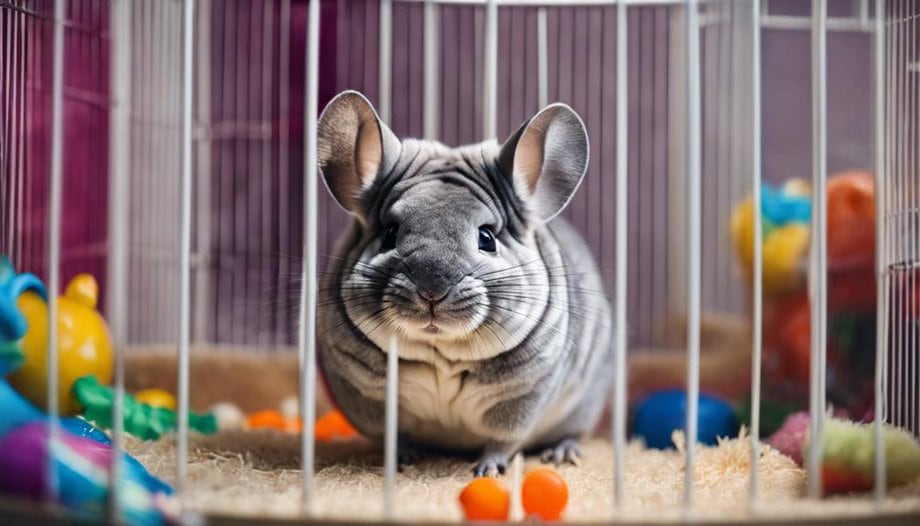
Living alone isn't ideal for chinchillas, as they're social animals that thrive in the company of their own kind. Chinchillas require social companionship to lead a healthy and fulfilling life. In the wild, they live in colonies, grooming each other, playing, and communicating through various vocalizations. Therefore, providing them with a companion of the same species is essential for their well-being in captivity.
When it comes to housing requirements, chinchillas need ample space to move around, exercise, and engage in natural behaviors. If kept alone, they may become stressed, anxious, or even depressed. A lack of social interaction can lead to behavioral issues and affect their overall health. To ensure their mental and physical health, it's recommended to house chinchillas in pairs or small groups, keeping in mind proper introductions and monitoring their interactions. By meeting their social needs, chinchillas can lead happier and healthier lives.
Chinchillas Love to Be Held
Chinchillas, while thriving in social companionship, have specific preferences when it comes to physical interaction, including being held. Despite their cute appearance and soft fur, chinchillas aren't naturally inclined to enjoy being held like some other pets. Understanding their holding habits and social interactions is crucial for their well-being.
Here are four key points to consider regarding chinchillas and being held:
- Chinchillas Value Their Independence: These small creatures are quite independent and prefer to explore their surroundings freely rather than being confined to being held.
- Sensitive Nervous System: Chinchillas have a delicate bone structure and a sensitive nervous system, making them easily startled by sudden movements or loud noises when being held.
- Bonding Through Respect: Chinchillas can form strong bonds with their owners through respectful interactions, such as offering treats and gentle petting rather than forceful holding.
- Social Interactions: Chinchillas enjoy social interactions with their owners and may show affection in various ways, such as sitting on a shoulder or nuzzling a hand during playtime.
Understanding and respecting a chinchilla's preferences for physical interaction can help foster a strong and trusting bond between the chinchilla and its owner.
Chinchillas Need Dust Baths Daily
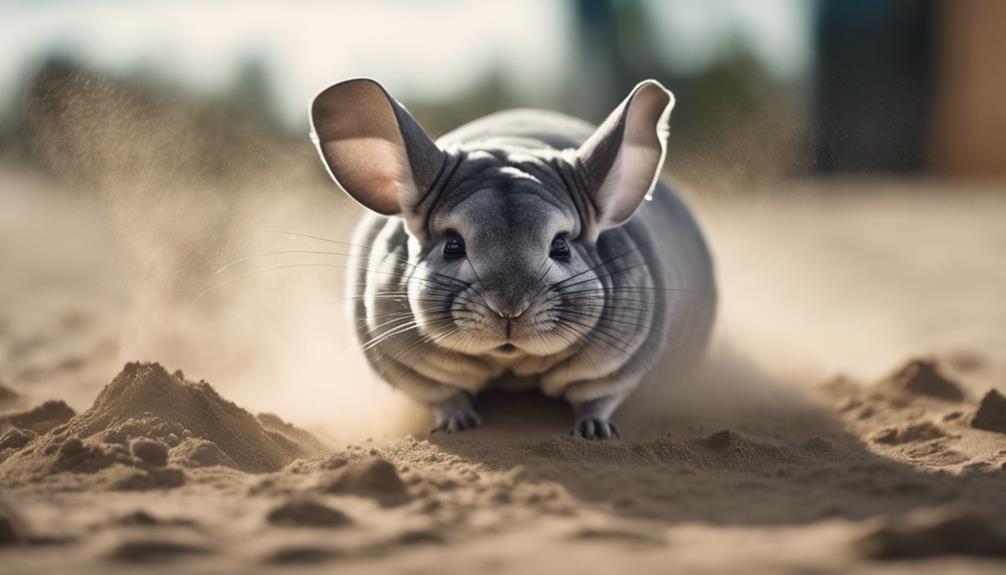
Chinchillas require daily dust baths to maintain their fur and overall health. Dust baths help chinchillas to remove excess oils and dirt from their fur, preventing matting and keeping their coat in top condition. Providing a dust bath for your chinchilla is essential for mimicking their natural grooming behaviors in the wild. It is recommended to use commercial chinchilla dust, as other substitutes like sand or talcum powder can be harmful to your pet's respiratory system.
To emphasize the importance of daily dust baths for chinchillas, here is a table showcasing some key aspects related to dust bathing:
| Aspect | Information |
|---|---|
| Frequency | Daily dust baths are necessary for chinchillas to maintain healthy fur. |
| Duration | Chinchillas typically enjoy dust baths for about 10-15 minutes each session. |
| Dust bath alternatives | Commercial chinchilla dust is the safest option; avoid using sand or talcum powder. |
| Dust bath containers | Use a dust bath house or container that is large enough for your chinchilla to roll around comfortably. |
| Cleaning | Replace the dust after each use to prevent bacteria buildup and ensure effectiveness. |
Chinchillas Are Low-Maintenance Pets
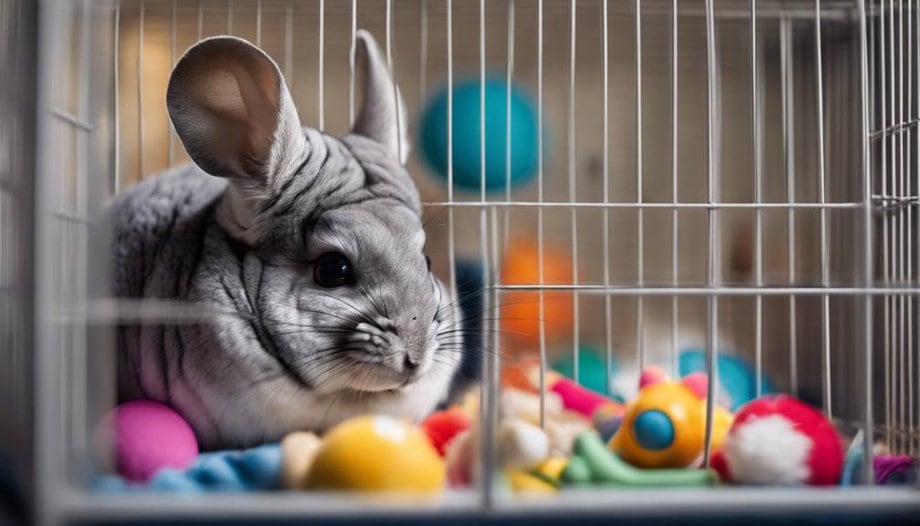
Being relatively independent in their care requirements, chinchillas can be considered low-maintenance pets compared to other animals. Chinchilla grooming is essential for their health. Here are some key points to consider when caring for chinchillas:
- Chinchilla Grooming: While chinchillas are meticulous self-groomers, they still need regular dust baths to maintain their fur's cleanliness and health.
- Chinchilla Socialization: Chinchillas are social animals and require regular interaction and playtime with their owners to stay mentally stimulated and happy.
- Chinchilla Diet: Providing a balanced diet of hay, pellets, and fresh water is crucial for a chinchilla's well-being. Avoid feeding them sugary treats or foods harmful to their digestive system.
- Chinchilla Habitat: Chinchillas need a spacious cage with room to jump and play. The cage should also have appropriate bedding, toys, and hiding spots to keep them entertained and comfortable.
Chinchillas Can Eat Anything
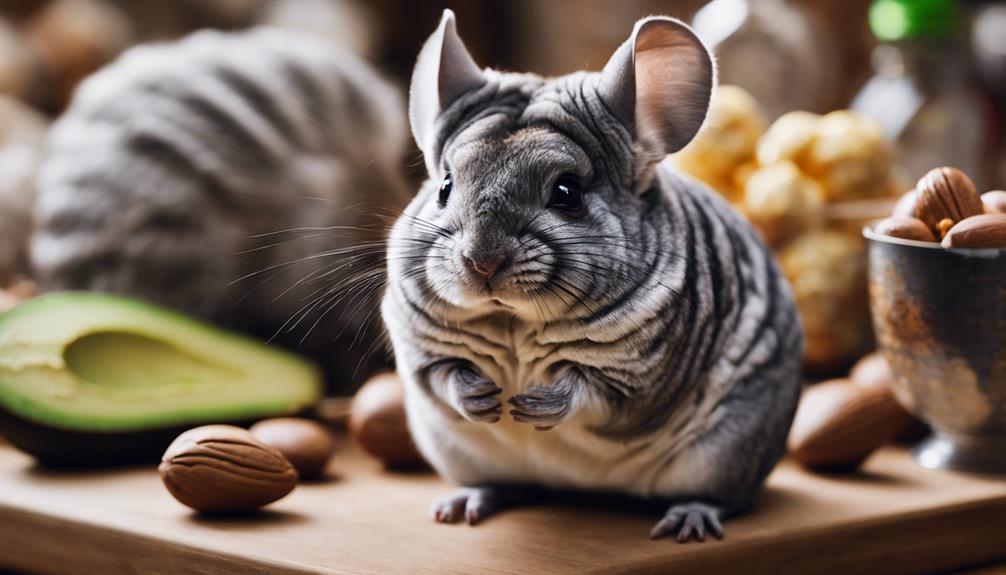
Contrary to common belief, chinchillas can't eat just anything and require a specific diet for optimal health and well-being. Food restrictions are crucial for chinchillas as they've sensitive digestive systems. A diet high in fiber is essential, mainly consisting of hay, pellets formulated specifically for chinchillas, and limited fresh fruits and vegetables. Foods high in fats or sugars can lead to digestive issues and obesity in these small animals.
In addition to a proper diet, chinchillas also need chew toys to maintain their dental health. Their teeth continuously grow, and chewing on appropriate items helps wear them down. Without adequate chew toys, chinchillas may develop dental problems, impacting their ability to eat and causing discomfort.
Understanding that chinchillas can't eat anything is fundamental for their well-being. By providing them with a balanced diet and suitable chew toys, chinchilla owners can ensure their pets lead healthy and happy lives.
Chinchillas Don't Need Exercise
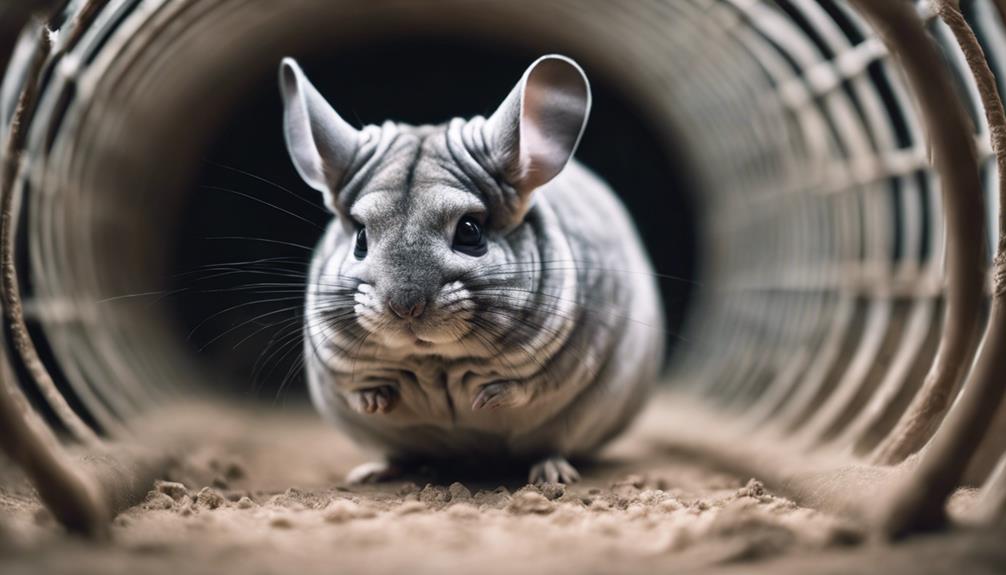
Contrary to popular belief, chinchillas do require regular exercise to maintain their physical health and mental well-being. Providing them with opportunities to move around helps prevent obesity, muscle atrophy, and other health issues.
Mental stimulation is equally important, as it prevents boredom and promotes overall happiness in these active little creatures.
Exercise Is Crucial
Exercise plays a crucial role in maintaining the health and well-being of chinchillas. While it's a common misconception that chinchillas don't need exercise, engaging in physical activities is vital for their overall wellness. Here are some reasons why exercise is essential for chinchillas:
- Physical Health: Regular exercise helps chinchillas maintain a healthy weight and prevents obesity.
- Mental Stimulation: Physical activity provides mental stimulation, keeping chinchillas engaged and happy.
- Prevents Boredom: Exercise helps prevent boredom, which can lead to behavioral issues in chinchillas.
- Bonding Opportunity: Engaging in playtime routines with your chinchilla through indoor activities can strengthen the bond between you and your pet.
Mental Stimulation Matters
Chinchillas, while requiring exercise for their physical well-being, also greatly benefit from mental stimulation to maintain their overall health and happiness. Enrichment activities play a crucial role in promoting the mental health of chinchillas by keeping them engaged, preventing boredom, and reducing stress. Providing toys that encourage natural behaviors like chewing, climbing, and foraging can offer mental stimulation. Interactive toys such as treat puzzles or tunnels can also keep chinchillas mentally active. Engaging in activities that challenge their problem-solving skills can improve cognitive function and prevent behavioral issues. By incorporating various enrichment activities into their daily routine, chinchilla owners can ensure their pets lead fulfilling and mentally stimulating lives.
| Benefits of Enrichment Activities |
|---|
| Prevents Boredom |
| Reduces Stress |
| Improves Cognitive Function |
| Enhances Problem-Solving Skills |
| Promotes Natural Behaviors |
Prevent Health Issues
To maintain optimal health and prevent potential issues, chinchillas require regular exercise as part of their daily routine. Not only does exercise help prevent obesity, but it also encourages grooming habits, which are essential for their well-being.
Here are four crucial tips to help chinchilla owners prevent health issues:
- Provide a spacious and safe exercise area for your chinchilla to run around.
- Offer chinchilla-safe toys and accessories to encourage physical activity.
- Supervise playtime to ensure your pet stays safe while exercising.
- Incorporate regular play sessions into your chinchilla's daily routine to promote overall health and prevent obesity.
Frequently Asked Questions
Can Chinchillas Be Trained to Do Tricks or Perform Certain Tasks?
Chinchillas can be trained to perform simple tricks, but their independent nature and short attention span can pose training challenges. While they may not master complex tasks, their behavior expectations can be met with patience and consistency.
Do Chinchillas Need a Specific Type of Bedding in Their Cages?
Chinchillas need soft bedding like aspen shavings or paper-based options to maintain cage cleanliness and support their health. Avoid cedar or pine as they can be harmful. Chinchillas prefer a clean environment for their well-being.
Are Chinchillas Social Animals That Enjoy Interacting With Other Chinchillas?
Chinchillas are social animals that thrive on interaction. Chinchilla playtime is essential for their well-being, fostering bonding and companionship between them. Providing opportunities for chinchillas to socialize with others enhances their quality of life.
Can Chinchillas Be Litter Trained Like Some Other Small Pets?
Potty training chinchillas is possible with patience and consistency. Positive reinforcement techniques can help in behavioral training. Chinchillas are intelligent animals capable of learning. Providing a designated area for litter can encourage successful training.
How Long Do Chinchillas Typically Live in Captivity?
In captivity, chinchillas typically live an average lifespan of 10-15 years with proper chinchilla care. Providing the best diet, mimicking their natural behaviors, and regular vet check-ups can help ensure they live a long and healthy life.











